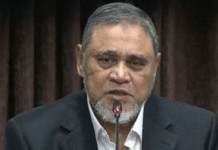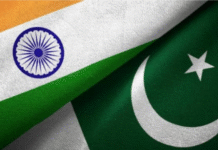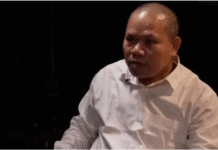Prime Minister Sheikh Hasina has urged the media to present news objectively in the interest of democracy in Bangladesh.
“You’ll be able to work freely if the democratic process is unhindered,” she said on Monday.
Hasina sought the help of journalists in making the approaching national election free and peaceful.
The Prime Minister was speaking at the inauguration of the Bangladesh Press Institute’s newly built eight-storey building on capital Dhaka’s Bailey Road.
Bangabandhu Sheikh Mujibur Rahman had approved the National Press Institute project in 1974 for training and professional development of journalists.
He had allocated Tk 1.5 million at that time for the construction of a dormitory, cafeteria, lecture room and library.
Hasina had laid the building’s foundation stone on Feb 8, 2000 during her first stint as the PM.
On Monday, she took a dig at Opposition Leader Khaleda Zia, who was the Prime Minister from 2001-06, for not constructing the facility.
“I want the democratic process to continue,” she said.
Terming the media as one of the key pillars of the state, the Prime Minister said journalists were the ‘lifeblood’ of the media.
“The military dictatorships after Aug 15, 1975 suspended projects meant for the development of the media.
“Newspapers were run by military decrees without any freedom,” said Hasina.
In the first annual general meeting of the Dhaka Journalists Union on Jul 16, 1972 Bangabandhu had said, “Democracy has certain principles. Similarly, journalism too thrives on certain principles. If we keep this in mind, we can resolve many problems.”
“Many even do not want to abide by the Constitution,” Hasina said in an obvious reference to her arch rival Khaleda Zia.
“The media has a responsibility towards the Constitution and the society. I hope they will follow it.”
About the talk shows on private TV channels, she regretted that the way many participants interpreted the Constitution would only encourage the anti-democratic forces.
“They do not consider the effect it would have on the society,” she said.
“They are learned persons and are not answerable to anyone. But we have to answer to Parliament and the people,” said the Prime Minister.
Hasina said she had no objection to truth. “What is objectionable is distortion.”
She said as many as 5,803 polls had been held at various levels under the incumbent government, electing 64,023 representatives.
Those polls had been free and fair, she told the journalists.
“You could not raise any allegation as there was no manipulation,” she said, adding that the next general election would also be free and fair.
The Prime Minister urged journalists to be more active in helping to raise social awareness to prevent ‘unsocial’ activities and hurting religious sentiments on the Internet.
She condemned all attacks on newspersons and the torching of their vehicles during political agitations as ‘unacceptable’, urging them to be vocal against such attacks.
“Bangabandhu would have been a journalist had he not been a politician,” she said, recalling her father’s attachment with the media persons.
“He was a correspondent of the Daily Ittehad when he was a student in Kolkata. Bangabandhu was also involved with the publication of the Daily Ittefaq,” she recalled.
She said many journalists had assisted Bangabandhu and many of them were his good friends.
It was the Sheikh Hasina-led government that first approved private television channel when it came to power in 1996 for the sake of the development of the media.

File Photo
During her second stint as PM in 2009, her government took various initiatives to protect journalists’ rights.
She hoped the new generation would be encouraged to join the profession and promised all assistance to help journalists attain international standards.
The newly opened facility will offer a greater scope for research and training. It will provide residential facilities for trainees and will also has an IT lab.
Information Minister Hasanul Haq Inu, said at the function that at present 614 dailies, 101 weeklies and 36 monthly newspapers are being published in the country.
He said there were 22 television channels including the state-run Bangladesh Television, 10 FM radio stations, and around a thousand web portals.
Source: Bd news24









